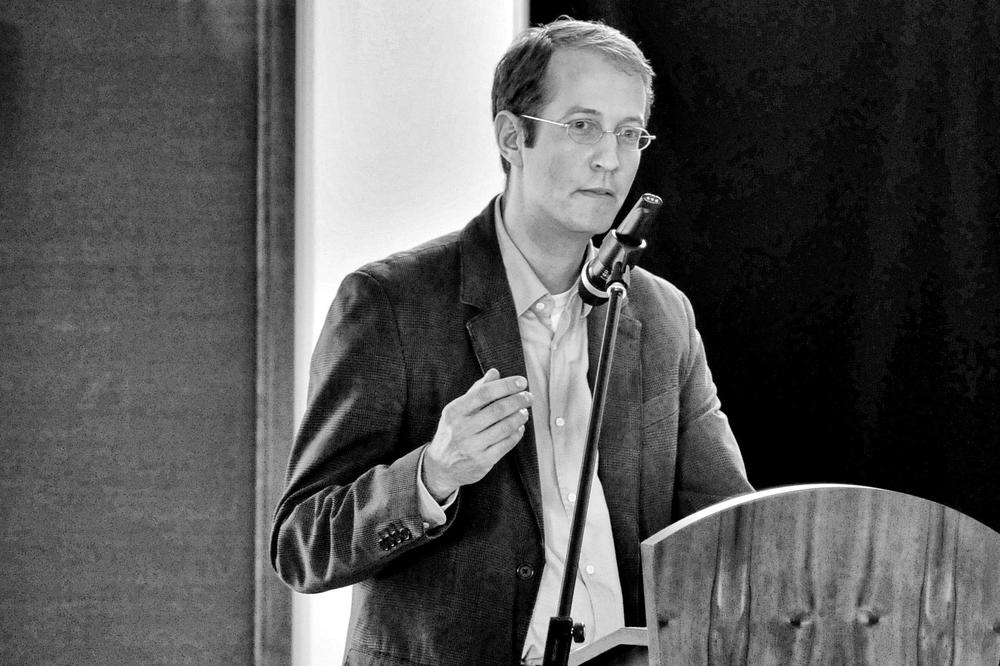History Knows No Borders
The Alexander von Humboldt Foundation presents historian Max Paul Friedman from the United States with the Friedrich Wilhelm Bessel Research Award. He is currently conducting research at Freie Universität’s Institute for Latin American Studies (LAI).
Aug 22, 2019
Max Paul Friedman is currently at Freie Universität’s Institute for Latin American Studies as the winner of a research award from the Alexander von Humboldt Foundation.
Image Credit: Thomas Hauzenberger
The term “transnationalism” might seem cumbersome to some, but for Max Paul Friedman it is a matter close to his heart. It refers to phenomena, such as migration or the circulation of cultural technologies across borders, that cannot be studied or explained through a perspective based solely on nation states. Studying the history of one nation alone is “not sufficient” – the larger context has to be taken into account, the historian says. “Social processes have always taken place across national borders.” Friedman cites the example of indigenous populations in Latin America and their struggles to gain recognition and emancipation. To study their history from a national perspective would be misleading. According to Friedman, it should be studied without depending on today’s national borders.
An expert on the United States’ foreign policy and Latin America, Professor Friedman has already received over 50 awards and scholarships. This latest accomplishment has brought him to Berlin. Winners of the Friedrich Wilhelm Bessel Research Award, which is granted by the Humboldt Foundation, receive 45,000 euros and participate in a research stay at a German university.
Transnationalism as a New Perspective in Research
Friedman is working together with history professor Stefan Rinke at the Institute for Latin American Studies (LAI) at Freie Universität. As the culmination of their work together, they plan to offer several workshops in Berlin and Washington D.C. They are scheduled to take place this winter and next year in July (2020), and their focus will be transnationalism. “Nationalism and nations are not something organic. Humans constructed them,” Friedman explains. “History played a strong role in this construction, so that people who otherwise had nothing in common saw themselves as belonging together to one nation.”
The workshops will examine examples of transnational occurrences from an interdisciplinary perspective, but more importantly, they will offer a forum for researchers to exchange ideas about what a transnational perspective means in different disciplines. “We want to bring together scholars from various fields – from history and literary studies, but also from sociology and anthropology for example – and discuss two main questions: How does the concept of transnationalism function in our research? And how is it used in our discipline?” His long-time colleague Stefan Rinke was already talking about transnationalism twenty years ago. In his book Der letzte freie Kontinent (The Last Free Continent), the LAI historian discusses the migration of Germans who headed to Latin America after the First World War.
The Good Neighbor Policy
Friedman wants to use his stay in Berlin to work on a book project about relations between Latin America and the USA from the end of the nineteenth century up to the beginning of the Cold War. Latin American countries long lived in fear that the dominating world power to the North would push its political interests in the region with the help of military interventions if necessary, which it regularly did in the first part of the twentieth century. To defend themselves, diplomats from several Latin American countries joined together with the goal of delegitimizing armed force as an acceptable instrument of politics. Argentinian lawyers were the first to act. They recognized that diplomatic cooperation on an international level was the only chance they had to represent their interests vis-à-vis their North American neighbors. Their work ultimately led the USA under President Franklin D. Roosevelt to renounce military threats, ushering in the Good Neighbor Policy.
Critical Perspectives on the Past and Present
Friedman has been interested in Latin America–United States relations for some time. His dissertation, Nazis and Good Neighbors: The United States Campaign against the Germans of Latin America in World War II, focused on the topic. The study examines a Federal Bureau of Investigation operation during World War II that attempted to track down Nazis who had immigrated to South America, deport them to Texas, and detain them there. But the US agents on the mission spoke neither Spanish, Portuguese, or German and were therefore unable to determine which of the Germans living in exile were actually National Socialists. Instead of identifying Nazis on the basis of evidence, they offered a bounty for denunciations. The result was that many people were wrongfully detained, including Jews who had escaped the concentration camps in Europe by coming to South America. While working on his dissertation, Friedman also spent time at the LAI conducting research.
New Threats Developing under Trump
Today, Friedman is critical of the current United States administration’s unabashed cynicism. “It is nothing new for the USA to collaborate with authoritarian governments or authorize military interventions. Trump openly praising dictators, while verbally attacking democratic allies and the fact that the US administration makes no secret of its interest in Venezuela’s oil reserves – those are new developments.” The threat connected with these developments is that they give totalitarian regimes little reason to improve human rights conditions in their countries.
The article originally appeared on August 19, 2019, in German in the campus.leben online magazine published by Freie Universität Berlin.

